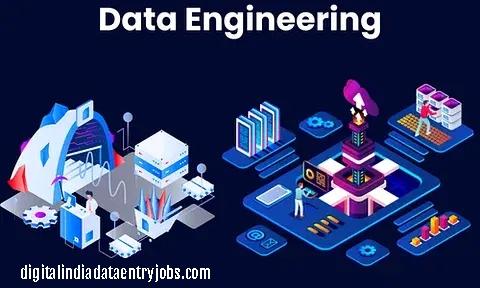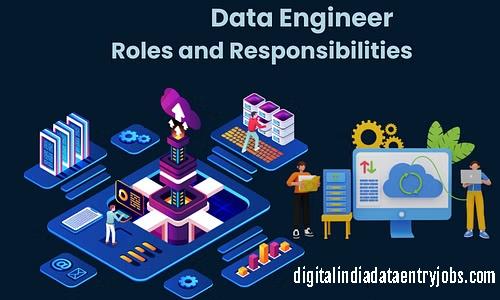Entry-Level Data Engineer:- Due to the rapid growth of both business intelligence and technology, there is a great demand for individuals just starting out in this field. At the core of every data-driven organization is data engineering, which transforms unprocessed data into insightful knowledge. The demand for qualified entry-level data engineers has increased as businesses rely more and more on data to make decisions.
Data engineering entry-level positions are crucial to the creation and upkeep of a robust data system. These individuals are responsible for the design, development, testing, and management of the systems (such as databases and large-scale processing units) that facilitate data movement and analysis. They play a critical role in ensuring that data is trustworthy, easily available, and of high quality.
This entry-level position requires technical expertise, problem-solving skills, and a thorough comprehension of data management concepts. Data engineers first focus on tasks like data modeling and extract, transform, and load (ETL) processes. Additionally, they collaborate with multidisciplinary groups to determine the data requirements.
Contents
What does an entry-level data engineer do?
Data pipeline builders, maintainers, and enhancers are known as data engineers. They are professionals in large-scale data processing and storage solutions and design systems to mine and acquire data. Not to be confused with data scientists, who create algorithms to examine data and provide solutions for businesses.
For the purpose of creating and managing an organization’s data system, an entry-level data engineer is essential. These workers execute a variety of tasks to transform unprocessed data into concepts that may be applied. By organizing, constructing, and structuring data frameworks, they guarantee that databases and processing systems are effective and scalable.
These individuals collaborate closely with teams from many departments to determine the data requirements and provide support for data modeling. Quality assurance, which involves verifying and validating data to ensure its accuracy and dependability, is a crucial aspect of their work. They assist in repairing and resolving problems with data processing and storage as entry-level data engineers.
Furthermore, as technology advances, aspiring data engineers must stay abreast of the latest instruments and techniques, molding their abilities to suit the ever-evolving demands of the industry. This work has a lot to teach those who wish to advance in the field of data engineering. It provides them with practical experience and knowledge of the intricate procedures that enable data-driven judgments in modern businesses.

Also Read:- Data Entry Jobs from Home, Uidaionlineaadharcard, Onlinereferjobs
What are the entry requirements for data engineering?
Obtain experience in a role that is entry-level.
The majority of recruiting managers demand prior expertise in an IT-related role from prospective data engineers. Data administrator and business intelligence analyst are two examples of entry-level jobs. Your abilities in these positions will help you get the recognition you deserve for higher-level careers.
A combination of technical expertise, academic credentials, and a fundamental understanding of how things work are typically required to enter the field of data engineering. Gaining a foundational academic background in computer science, information technology, or a similar field with a bachelor’s degree is beneficial. However, some positions may consider candidates with degrees in engineering, mathematics, or other quantitative subjects.
One of the main requirements for admission is having technical skills. Employers frequently want candidates with database management system experience as well as programming skills in languages like Python, Java, or SQL. Those interested in applying should be well-versed in data modeling, ETL techniques, and data warehousing concepts.
It’s also beneficial to gain practical experience through projects, jobs, or comparable coursework. Experience with cloud platforms like AWS or Azure, as well as data engineering tools and technologies like Apache Hadoop and Apache Spark, can help candidates stand out more.
Successful data engineering positions also require problem-solving, meticulous attention to detail, and effective communication skills. Many organizations are searching for individuals who can collaborate well with people from diverse backgrounds and who can adjust to the evolving landscape of data technologies.
What qualifications are necessary for a data engineering position at the entry-level?
A data engineering entry-level position requires proficiency with technology, problem-solving, and interpersonal skills. To start, you must be well-versed in computer languages such as Python, Java, or SQL in order to manipulate data and extract valuable information from it. Proficiency in data modeling, comprehension of database management systems, and familiarity with ETL (Extract, Transform, Load) procedures are essential technical competencies.
A new data engineer should also be familiar with cloud platforms like AWS or Azure and big data tools like Apache Hadoop and Apache Spark, as the industry is trending towards solutions that can be scaled up or down with ease. A candidate is eligible for the job if they are familiar with these platforms.
Since managing, storing, and integrating data can present challenges, data engineers must be problem-solvers. It is crucial to pay attention to details in order to ensure the accuracy and dependability of the information. Since they must collaborate closely with numerous departments to determine what data is required and how it fits into the overall data strategy, data engineers must be proficient communicators and team players.
Strong academic credentials, problem-solving abilities, and interpersonal skills are essential for an entry-level data engineer. They now possess a broad range of abilities that are essential to succeed in the complex field of data engineering.
Also Read:- Data Entry Jobs in Bangalore, scholarships gov, Companycontactdetail

What is the role of an entry-level data engineer?
Data engineers are in charge of planning, constructing, and maintaining the infrastructure needed for data processing, retrieval, and storage. Working with huge data sets, they create data pipelines that transfer information from source systems to data lakes, warehouses, and other processing and storing systems.
For a corporation to establish and maintain a strong data infrastructure, entry-level data engineers play a critical role in the building process. These individuals enable a great deal of significant events to occur during the data journey. To ensure that they can manage massive volumes of data effectively and on a broad scale, they develop and construct data architectures, such as databases and processing systems.
The Extract, Transform, and Load (ETL) procedures involve novice data engineers. These comprise gathering information from various sources, transforming it into a usable format, and transferring it to systems that will make use of it. By putting data in the right order for optimal analysis, they aid in data modelling. A significant aspect of their work involves quality assurance, which entails verifying and confirming data to ensure its accuracy and dependability.
In order to determine what data is required and ensure that the organization’s data system satisfies its goals, beginning data engineers must collaborate extensively with cross-functional teams. When dealing with issues related to data processing and storage, troubleshooting, and problem-solving are critical abilities that you must be able to employ fast.
How can a novice obtain hands-on experience in data engineering?
In order to gain practical experience in data engineering at the entry-level, you must complete genuine projects, complete internships, and continue your education. To begin applying what you’ve learned, start by creating a résumé and working on personal projects. In the real world, tools like Apache Spark, SQL, and Python can be utilized for tasks like data cleansing, analysis, and transformation.
Securing an internship is an excellent method of gaining practical experience. In order to obtain actual work experience, seek out occupations that employers will let you perform, even if they don’t pay. Through internships, students can apply their classroom knowledge to real-world problem-solving and gain further business knowledge.
On websites like GitHub, you can contribute to open-source projects related to data engineering. This not only gives you more practical experience to list on your CV but also enables you to collaborate with more experienced professionals and demonstrate your abilities.
Attending online seminars and tutorials will keep you current on the newest tools and technologies. Some courses on platforms such as Coursera, Udacity, and DataCamp aim to provide students with hands-on experience in data engineering.
Establishing a network is crucial. Attend meetings, conferences, and workshops to network with professionals in your sector. Look for educational institutions that will assign you to seasoned data engineers so you may pick their brains.
Starting out in the field, gaining practical experience in data engineering means taking the initiative to work on side projects, pursue jobs, go back to school, contribute to open-source projects, and network in order to lay the groundwork for a successful career.
Entry Level Data Engineer Jobs, Employment
Seeking entry-level data engineer employment is the best course of action for anyone looking to begin a career in the fast-paced profession of data engineering. Creating, maintaining, and managing data structures for corporations is typically the responsibility of those in these positions.
You might assist with database creation, ETL procedures, and data modeling as an entry-level data engineer. Every day, these professionals collaborate with groups from many departments to ensure that the organization’s data infrastructure satisfies its objectives and requirements.
Employers typically want candidates with strong educational backgrounds, particularly in computer science, information technology, or related fields. The purpose of many entry-level positions is to provide on-the-job training, making them open to recent college graduates. Conversely, certain professions could require project or work experience prior to application.
Aspiring data engineers should understand the fundamentals of data warehousing, be conversant with big data technologies like Apache Hadoop and Apache Spark, and be able to write in languages like Python or SQL. For these positions, being meticulous and having strong problem-solving skills are also essential.
Entry-level data engineer positions are ideal for persons who wish to contribute to making data more usable in the workplace in a world where ideas based on data are becoming more and more significant. These positions provide individuals with a solid foundation for career advancement and an opportunity to rise to prominence in the rapidly evolving field of data engineering.
1000+ Entry Level Data Engineer jobs in the United States
There are more than 1000 openings for entry-level data engineers in the US, indicating the rapid growth of the sector and the need for more qualified workers. The fact that there is employment available for data handling and processing professionals in a variety of industries, including e-commerce, healthcare, technology, and finance, indicates that there is a continuing need for these professionals.
Aspiring data engineers have a lot of options that can accommodate a variety of hobbies and professional objectives. These positions frequently entail tasks like database design, ETL processing, and multi-team collaboration in order to promote data-driven decision-making.
While some employers may accept candidates with varying educational backgrounds, the majority require at least a bachelor’s degree in computer science, information technology, or a similar profession. For those looking to enter the field of data engineering who have recently graduated from college or possess basic abilities, these entry-level positions may be ideal.
Those interested in working for the company should highlight in their applications their proficiency with Python and SQL, their data modeling skills, and any relevant project or internship experience. There are several entry-level data engineer positions available in the US. This demonstrates the strength of the job market as well as the wide range of opportunities available to anyone looking to work in the fascinating subject of data engineering.
For those who are new to data science and technology, data engineering is a vital and fascinating topic. As more companies come to understand the value of data in making strategic decisions, there is an enormous demand for knowledgeable and innovative Entry Level Data Engineering professionals.

Also Read:- Data Entry Jobs in Kolkata, Digitizeindiagov, indnewsupdates.com
Conclusion
When technology evolves, entry-level data engineering workers are frequently the first to apply new tools and techniques. You’ll require problem-solving and collaborative skills as you advance from entry-level to senior data engineer positions. By improving data engineering techniques with every challenge they work on, these specialists define the future of how businesses derive value from their data.
Data engineering is an entry-level position that is not only a great place to start in a world where data is becoming more and more important, but it is also crucial for industry success and development. As well as providing opportunities for professional and personal development, becoming a data engineer will put a person on a path that will directly affect the direction of data-driven decision-making in the future.
#Saras

